|
|
| Chinese
Recipes |
Chinese 24
Hour Rice, Left-over Rice or Chow Fan, Dong Fan |
|
What to do with
left-over rice is a problem for many people all over
the world. Several TV chefs including the excellent
Martin
Yan "Quick and Easy" have come up with
great recipes for creating tasty meals from this left-over.
Below we give our home-made versions of this easy dish:
Let me tell you a secret:
1. Chow Fan is stir-fryed cooked rice
2. Chow Min (pronounced chow mein)
is stir-fryed cooked noodles
In Canton Chow Mein is supplemented by many additional
ingredients, as we know it is the west. It is usually
cooked fresh to order, where you specify the combination
of main ingredients.
Chow Fan is seldom ever made from freshly cooked rice,
unless as a special side dish to a banquet where foreigners
will be present. Normally it is made to use up the left-over
rice, and should be cooked within 24-hours. |
|
Ingredients:
1 lb cooked rice
2 eggs
1 tablespoon soy sauce or fish sauce
1 tablespoon oil
2 cups water
Cantonese chefs simply heat the oil and add the
cold rice to a hot wok. Add a little water to
prevent sticking and stir continuously through
the whole cooking process.
|
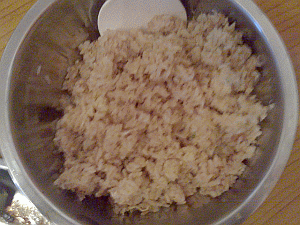
|
|
|
Once the rice is slightly browned add the two eggs
and mix well in. Expect some to stick to the bottom
of the wok and burn, so stir to remove this before it
is truly burnt. Once the eggs are settled you have a
rice goo. Add several shakes of fish oil sauce and mix
well in. Leave to stand for a minute, mix again and
serve.
Chinese love this as a plain and filling accompaniment
to many meals. I prefer to cook this as follows:
Tip
1. Unless you are cooking shellfish
(excluding prawns) as you main feature, forget about
the fish oil sauce and use a quality Soy Sauce.
Recipe 1 - Jonno's 24-hour rice or Chow Fan
Main Ingredients almost as above:
1 lb cooked rice, 2 eggs, 1 tbsp soy sauce, 3
tbsp oil, water if required
To this Add:
* 1 wardrobe (Bulb) of garlic, half
crushed and diced, half whole and peeled.
* 3 inches of fresh ginger - this is
a large piece of wet ginger that is peeled and finely
diced into matchstalk slivers. If it is properly 'wet'
crush it first before dicing. The total bulk should
be about the same as the garlic.
* Salt and pepper. This dish seriously
needs added salt, especially if the original rice cooking
was done simply with only rice and water (Default).
* 3 or 4 spring onions (Scallions) diced into small
pieces.
* 1 large white onion. Peel and dice into quarter inch
squares.
Method
Add a little oil to a very hot wok and swill around
to coat once hot. Add the ginger, garlic and flash-fry
for less than 1-minute. Tip in the cooked (Boiled) rice
and mix well without overworking. This means you leave
it for 10 seconds, turn it, and leave it again, and
again.
Once your rice has taken on the oil and flavours (2-minutes)
add all the onions - we are combining the different
properties of both white and spring onions here. 1-minute
of very gentle turning and leaving should finish this
part.
Take one egg and break into a well you have made in
the centre of the wok. It should still have oil in it,
so add more oil and heat if not. Cantonese chefs can
drizzle the egg into the mix from the shell, but if
you end up with a whole egg in the wok, this is fine
too. Wait until the white starts to become solid, and
gently stir this to make ribbons. If the timing and
heat is correct, these ribbons should follow your chopsticks
or fork. Once around break the yolk if not already broached,
and do likewise, but slower. We are looking for small
lumps of cooked yolk to complement the strands of egg
white. This is quite difficult at first, so take your
time.
Once accomplished, very gently stir into the mixture,
and repeat with the other egg. Cantonese do both eggs
at once, but this gets tricky!
Now it is time to add the soy sauce, which will bring
a salty taste to the dish.Chug in several large dashes
from the bottle, and mix very gently. Add more as required
and when satisfied, taste the dish!
You are now adding refined table salt (Cooking is too
quick for sea-salt unless in a brine) and finely ground
black pepper. Add the pepper first, and then the salt,
which fixes the final base flavour.
You now have the basic dish ready for serving to table.
However, it is not yet a meal in itself, as for this
we need to add other ingredients like meat, vegetables
or anything else you can think of!
My Choice
I personally love to add: Prawns, diced mushrooms, colours
of assorted capsicum peppers, and a little freshly chopped
hot chilli right at the end. Small cubes of processed
pork are excellent, the meat available in packets in
any supermarket. Thin strips of chicken meat also works
very well. Add these ingredients around the same time
you add the eggs.
To be honest, I actually make this as a British 'Stir-Fry',
which essentially means I replace half the rice with
standard yellow thin wheat noodles - like the ones that
you get in a 'snack-pot', whatever.
I also like to add a good handful of beansprouts and
a few cooked, diced water chestnuts.
Vegetarians and Vegans
You can make this vegetarian and vegan by adding only
vegetables and gourds. Whatever you add should be diced
to pea size, and will probably need par-cooking first
= not fully cooked, just beginning to soften. Given
you dice before boiling, then this can be very quick.
Sweet Version
So what works? Mango is excellent, diced courgettes
or Chinese marrow, broad beans or 'doa gok'. For something
unusual and delicious add Chinese red dates or rose
hips, and longgnun or lychee. This version will be slightly
sweet, so how about adding some diced banana? Chinese
sweet yams or Fan Shei will also work very well. If
cooking a sweet version you may want to replace the
salt and pepper with a trickle of honey - up to you!
Girls will probably love a little pineapple also, as
this lends towards making this dish naturally 'sweet
and sour'.
We are also considering presentation to table here,
so making this colourful is very good. You can always
add stalwarts like sweetcorn and peas, but we are trying
to redefine your culinary horizons here - so for a savoury
version, let's add some diced celery rings, a few 'Butter
Beans', soaked soy and/or cashew nuts, and strips of
peeled Chinese black mushroom. This should be soaked
overnight before chopping and represents 'meat'. To
really make this Cantonese, then shell and chop one,
'1-hundred-year-old' egg into pea-sized chunks and add
near the end of cooking.
Carnivores
Any meat added should be diced into small chunks (Exceptions:
small Prawns). Basically if you dice your meat to pea-size
and add it after the garlic and ginger, then it is already
cooked before the rice (and noodles) are put in the
wok. I would add prawns later, as they need far less
cooking time, especially as I am presuming you are using
the pre-cooked frozen versions? Fresh ones should go
in just before the eggs, and the same for squid.
Rule of thumb:
Vegetables are actually harder to cook with this dish
than most meats, whilst dried fungi are another matter.
Here is the 'Rule of Thumb' I use when using various
meats diced into pea-sized squares or strips:
2 minutes = Red Meat: - Beef, Lamb,
Goat, Donkey, Horse, Water Buffalo, Dog.
90 Seconds = Gray Meat: - Duck, Goose,
Dove, Pheasant, Quail.
1 minute = White Meat: - Chicken, Pork,
Cat, most Rodents.
40 Seconds = Fish and Shellfish: -
Prawns, Squid, Abalone, Cockles, Eel slices, Fish (waifer
slices or small chunks), Jellyfish.
20 Seconds = Snake meat (If you can
find any?), most reptiles, bugs and insects. Reduce
to 10 seconds for Black or Red Ants (Beijing delicacy).
Recipe 2 - Coconut Rice
This is the most simple and delicious rice anywhere!
Our presentation is to make a large dome of rice which
has within and without, coconut creamed sauce. This
should be enough for 4 starving people.
You can use left-over rice, or boil fresh - it doesn't
matter. You can even mix the two to save wastage. Whatever
way you get the rice, wait until it is cold before commencing
cooking.
Open a quality tin of coconut milk and add to the wok.
To this add a pinch of nutmeg, a small pinch of cinnamon,
and a small pinch of Chinese Ziran powder. Mix well
and heat to a very gentle simmer.
Add the rice to this warm mixture and fold gently. Bring
back to a simmer and stirring occasionally, wait until
the rice is heated through. As a rough guide this should
take 5-minutes and then it is ready to serve.
Lightly press the rice into a mould - this can be anything
that takes your fancy, such as a jelly mould, a basin
or large bowl. You can make this using individual rice
bowls, but a better presentation is one large dish such
as a cereal or soup dish. A metal Chinese deep bowl
I find ideal.
Once the rice has filled the bowl, put a serving plate
in top and turn over. You may need to bang this on the
counter, and be prepared to make finishing touches if
any rice sticks to the bowl. Once looking good, simply
pour over the remaining coconut milk from the hot wok
and serve to table. Edible orchid flowers make for a
truly exciting presentation.
Recipe 3 - Rice Waifers or Lang Fan
Country folk usually cook a large family wok of rice
for every meal. These are heated on wood-burning stoves
similar to a western 'Aga'. This is allowed to sit on
the diminishing heat throughout the meal, and left to
cool afterwards.
Usually any left over soft rice is used to feed the
chickens, but there remains a delicious crust of burnt
(Not charred) rice. This is known as 'Lang Fan', and
is peeled from the wok and eaten as one would a biscuit
or treat. Knowing how this originated makes it easy
for us to replicate and vary in a modern kitchen.
Take a hot dry wok and simply add some left over rice.
Half a pound should be a good place to start. Add a
little water and repeat as necessary, mixing well in
until a the rice glutenises and becomes slightly stodgy.
We are aiming to create a slight paste with clearly
separate rice grains - not turn this into a goo!
Spread this around the wok so that it is 1/4 inch deep.
The true abilities of the wok now present themselves,
as you can tip to bring the heat source to points all
around the sides of the wok. Use a medium heat and leave
in each spot for about 1-minute. Work around the wok
resting 8 times until all the sides have been cooked.
Don't forget the base also, although this is probably
already well cooked.
Check progress by prizing away the cooked rice from
the wok sides. If it has a golden brown colour then
it is cooked and will separate easily. Do not force
areas that are undercooked - simply return that area
to the heat and leave for a while.
Eventually you will end up with one side nicely cooked
and floating free in the wok. Gently pat down the surface
and turn over to cook the other side. Repeat the process,
but know it will not take as long. Once the second side
is golden brown the dish is ready to be served.
Variations
Like me you may find this to be rather bland? It definitely
needs salt for a savoury version, or sugar for a sweet
one. Also remember that you can add virtually anything
to the original rice, and you can use other liquids
instead of water.
What happens if you use a standard Cantonese chicken
bouillon stock instead? You will end up with rice-cakes
tasting of chicken of course! Therefore add a little
salt and pepper, plus some very finely diced vegetables,
or chicken, or both. You will end up with 'Crispy chicken
Rice Cakes'.
Nuts
I doubt the above would be a great hit with most people,
so what happens if we use finely diced nuts instead?
This would never be for me personally, but I do know
many people love nuts. For this I would add a little
nutmeg and mix all the ingredients well in.
Honey
This dish is perfect for making a sweet alternative.
This time you need to dilute the honey with a little
water to make it more fluid. You can use Chinese Honey
Sticks or sugar just as easily, but honey works far
better.
Add the thinned honey liquid to the rice and mix well
in, carefully. We are using this instead of the water
as in the main method given above. This time you will
need to coat the wok with a smear of oil to prevent
sticking - just like greasing a baking tin. The honey
will make the rice burn quicker once hot, so be careful
the first time you try this at home.
This time when you turn the rice over, you will probably
need to re-grease the wok and I recommend you also brush
the uncooked side with a little of the liquid honey
mixture, as this will have sunk on the first cooking.
When the second side is cooked to golden brown it is
ready to be served.
Variations
1. Chop a little honey stick very finely
and sprinkle over the mixture when searing the first
side. A coarse granulated sugar will work equally as
well, but small sugar crystals are the best!
2. Use mango juice instead of honey,
and finely dice some mango or mixed fruit into the rice.
Rice Cakes
To bring this unusual and long section to a close, let's
look at our options for using two sheets of Lang Fan
cooked on one side only; or half cooked on the inner
side. The idea is to use one as a base, add some filling,
then put the other on top. Cut this into bars and serve
to hungry and unsuspecting guests!
Everything mentioned above works great when served in
this style, and it gives the chef an opportunity to
present a true savoury or fruit theme.
Generally Lang Fan works best with 'sweet and fruity'. |
|
|
This information is as supplied by ourselves, and ably
supported by our friends and various internet portals. |
|
| Search
this Website |
|
|
| Boy
Cooking |
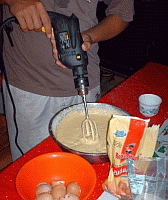 |
| Béchamel Related |
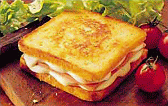
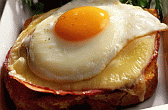
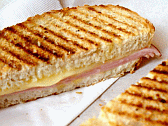
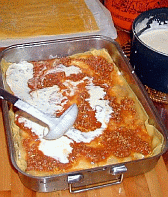
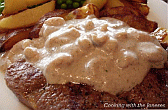
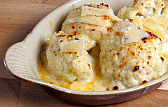
|
| Descriptions |
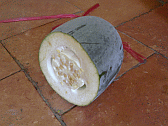
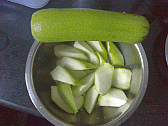
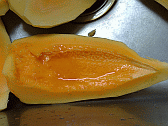
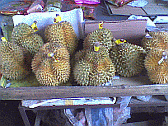
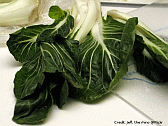
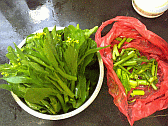
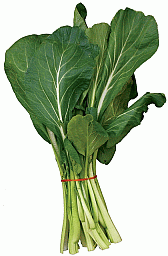
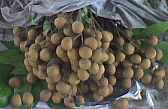
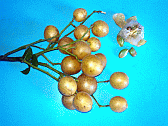
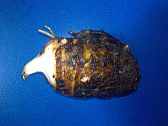
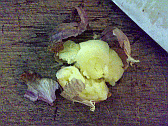
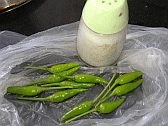
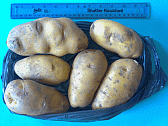
|
| Chinese Recipes |
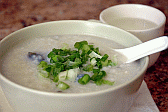
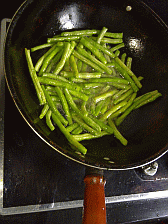
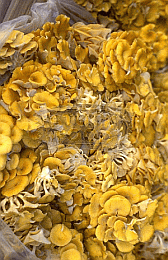
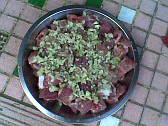
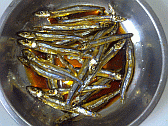
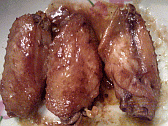
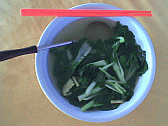
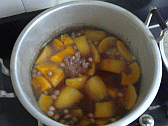
|
|